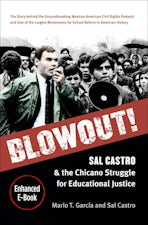The Latino Generation
Voices of the New America
By Mario T. García
288 pp., 6.125 x 9.25, 13 halftones, notes, index
-
Paperback ISBN: 978-1-4696-4560-5
Published: August 2018 -
E-book EPUB ISBN: 978-1-4696-1412-0
Published: May 2014 -
E-book PDF ISBN: 979-8-8908-4491-0
Published: May 2014
Buy this Book
- Paperback $29.95
- E-Book $19.99
- Audiobook
For Professors:
Free E-Exam Copies
Collected over several years, the testimonios follow the history of the speakers in thought-provoking ways, reminding us that members of the Latino Generation are not merely a demographic group but, rather, real individuals, as American in their aspirations and loyalty as the members of any other ethnic group in the country.
About the Author
Mario T. García is Distinguished Professor of Chicano Studies and History at the University of California, Santa Barbara. He is the recipient of the 2016 Oral History Association Stetson Kennedy Vox Populi Award. He is co-author of Blowout!: Sal Castro and the Chicano Struggle for Educational Justice.
For more information about Mario T. García, visit
the
Author
Page.
Reviews
“Skillfully written, The Latino Generation goes beyond any stereotypical views that many Americans may have toward Latinos.--Santa Fe New Mexican
"An outstanding analysis of the new Latino Generation as a way to explain the significance of a new America that is developing."--Southwestern Historical Quarterly
"Garcia has generated an interesting cross-sectional portrait of the largest ethnic minority in the nation."--El Paso Time
"No scholar has more incisively shown the historical contours of what it means to be Latino than Mario T. García. In The Latino Generation, García draws on the life histories of Latinos coming of age, revealing the complexities of contemporary Latino and, indeed, American identity. The book is required reading for anyone hoping to understand how Latinos are both redefining and being redefined by the United States."--Tomás R. Jiménez, author of Replenished Ethnicity
"Mario García's The Latino Generation is based on thirteen oral histories that he conducted over the span of several years with University of California, Santa Barbara, students. By historicizing the lives of these young people, García places them within the continuum of Chicano/Latino history, and thus emerges a portrait of a specific era from the perspective of those who lived it. García makes clear that history is--not was, but is--and that everyday people are the engines of change. This book will become a major contribution and enhance our understanding of the experiences of this Latino Generation of the early twenty-first century."--Ernesto Chavez, University of Texas at El Paso
"A deeply moving and personal account of the struggles these young men and women faced not only in negotiating a social, political, and economic terrain marked by the anti-immigrant hostility of the late twentieth and early twenty-first century, but also in waging intimate battles within their own families as each crafted his or her own meaning of the so-called American dream. García's book provides insight into the hopes and fears of the newest generation of Latinos as they struggle to attain academic success and a place in American society on their terms."--Monica Perales, author of Smeltertown: Making and Remembering a Southwest Border Community


